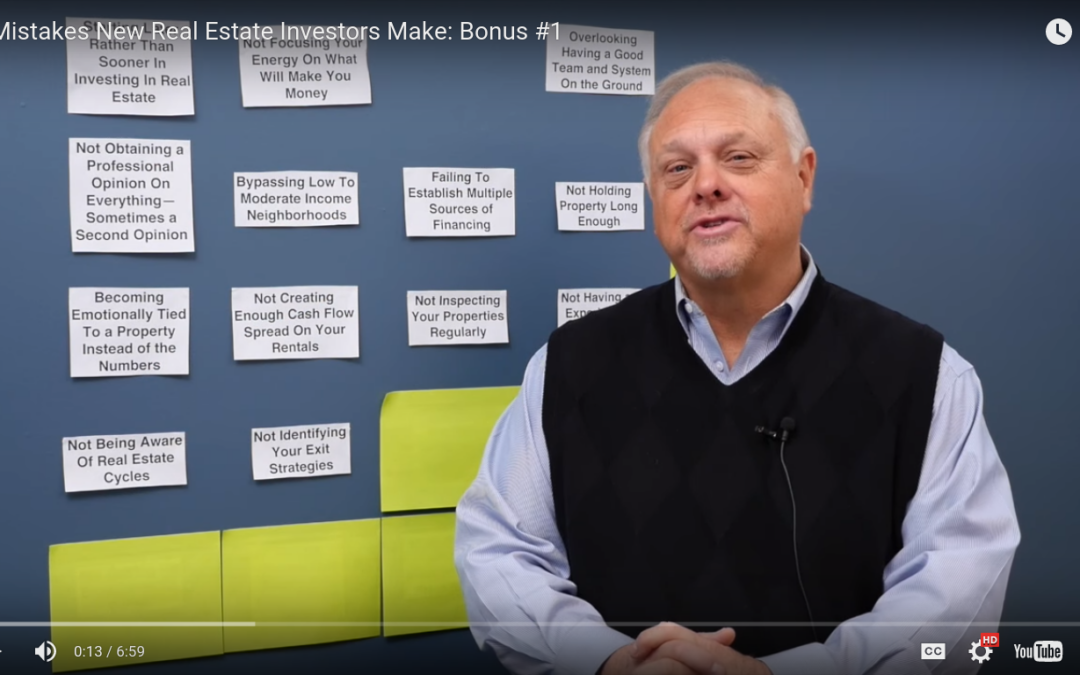In the last two months, I’ve covered the primary 14 mistakes that new real estate investors make. But I’ve got more! For the next several vlogs, I’m going to talk about some bonus mistakes. To catch up on the series, visit my Youtube channel.
Bonus #1: Not Having Contingency Clauses.
Contingency clauses are typically things that the seller has to perform or allow with the property. These clauses are so you have an out: the ability to not have to follow through with the contract. You always protections like this–in fact, in any business deal you ever do, not just real estate, you want to know what your outs are! If you know what your outs are, you know how to protect yourself appropriately.
1. Financing Contingency: A financing contingency is boilerplate and common. To go about it when you write a contract on a house, you typically provide a pre-qualified letter. So if you’re a buyer, you’ll have already wanted to go to your lender, either a mortgage company, bank, or private lender, to get this letter.
Most of the time people will put a financing contingency in real estate deals. Sometimes I don’t. If I’m paying cash, I just provide proof of funds, which shows the cash in a particular bank account. Don’t ever show them all your bank accounts, though. If you’re writing a contract, only show enough money to perform on the contract you’re writing. But when buying a personal house or a vacation house, a financing contingency is a normal thing to have.
2. Inspection Contingency: As we move through the contract process, you also will want to have a contingency on inspection. That is also boilerplate or common. The inspection phase is a really good time to be able to renegotiate the price downward if you’re the buyer—especially if you discover something in the property that needs to be improved.
I remember back when I was buying quite a few properties a year, every now and then I would run across an older property with aluminum wiring. I don’t really advise anyone to buy a property with aluminum wiring, but there are still a lot of them out there in older neighborhoods. Most of the time, if I decided to move forward with the house, it would only be after my electrical contractor inspected it carefully and we ran the numbers for if I had to completely rewire the house (which is quite expensive if you’re watching this). Then I would negotiate the price quite downward in the aluminum wiring situation. I would try to mitigate some of the problems with the electrical contractor. Inspection is a great time to negotiate.
3. Approval of the Partner Contingency: Another thing I do is make sure to write “I’m going to write this contract, but I’m going to do it with the approval of my partner.” Frankly, your partner could be your spouse. But you put it in there because it gives you an out. Let’s say you wrote a contract saying you’ll purchase a house for a certain amount of money and then you discover something around that deal that’s not quite right. Then you can always say, “Well my partner hasn’t approved that.” You have an out. Now some people will accept that and some don’t.
There are other outs and contingencies you can put in contracts, but these are the primary ones: financing, inspection, and approval of the partner.
Now, I see people who take my real estate course get analysis paralysis. They never write a contract. But you’re never going to buy a piece of real estate until you learn to write contracts! Sometimes I would write three or four contracts at the same time on multiple properties. Now most people can’t do that because they can’t execute the contract if they all came through at the same time. If not, then you’re misrepresenting who you are. But you have to get off the chair and move forward. Knowing how to write contracts is something that’s key.
So make sure you have good contingency clauses in your contracts! I appreciate you tuning into the vlogs. You can help me out if you hit like or comment or share. I’ll see you next time!
Join me every Thursday for more tips on investing in real estate.




Hi Billy , I’m here and learning a lot! I’m a beginner and feel like I’m being lead toward real estate, But as a single woman not sure buying properties to rent is the best fit for me. I’m gifted in decorating and am more interested in flipping. Can you give me some tips specific to this.